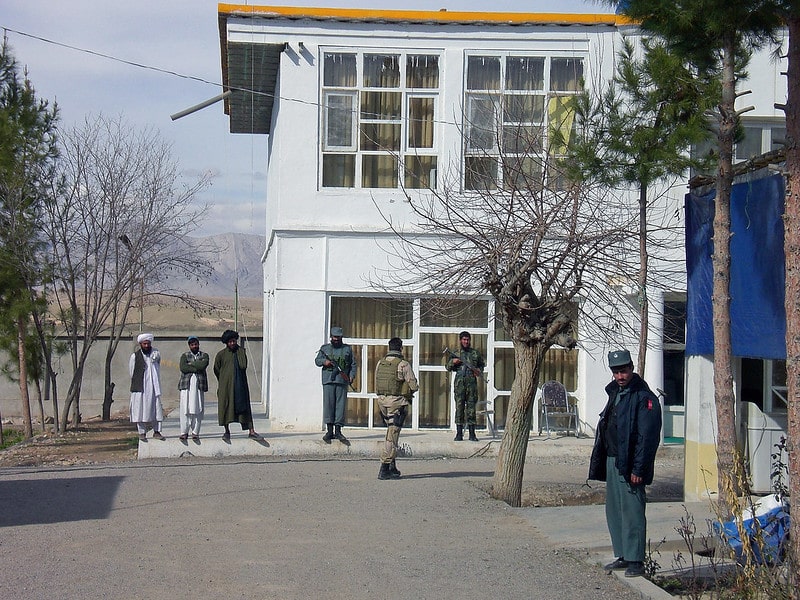Photo: Afghan guards in Uruzgan - Flickr
The cabinet has decided not to safeguard Afghan guards who protected the Embassy in Kabul and the military base in Uruzgan of the Netherlands. The former Afghan guards are at risk domestically due to their cooperation with a foreign government since the Taliban regained power. Although the motion-Piri, passed under cabinet Rutte IV, called for additional efforts for this group, the current cabinet has decided not to provide a safe haven for them. The issue has caused outrage in the Lower House, with many speaking of a ''debt of honour'' and ultimately damaging the Dutch international reputation.
Moral duty pushed aside
MPs called the decision "heartless" and "extremely painful". The cabinet's attitude, towards people who are in mortal danger because they protected Dutch soldiers and diplomats, drives many opposition members to great frustration. In the Lower House, harsh words pass through the chamber from the opposition. Nine opposition parties, all except JA21, have expressed that they find the cabinet's decision to do nothing for the Afghan guardsmen outrageous. Individuals who have worked for a foreign organisation, such as the Dutch army or embassy, and are now in danger may hope for help. It is, as CDA MP Boswijk well summarises, a debt of honour that has been broken. After all, these guards stood side by side with Dutch military and embassy personnel for years.
The outrage at and cruelty of the decision that is felt is also fuelled by the comparable situation with Afghan interpreters in 2022. At the time, after intense negotiations, the Dutch government did bring these interpreters and their families to safety in the Netherlands. This happened because the interpreters no longer felt safe in Afghanistan for the same reasons: the Taliban had taken power, and a UN Security Council report showed that dozens of former interpreters had been murdered. The same mercy and empathy is no longer to be found in the current administration.
International reputation at stake
Other countries with long-term missions in Afghanistan, such as Australia and the United States, did make a point of bringing all members involved to safety. At America they went even further in helping their Afghan employees, advocating for permanent residency for tens of thousands of these former employees. The Netherlands seems to be the only country lagging behind in fulfilling its moral obligations to Afghan employees and does not seem to be prioritising this.
The trust in and reputation of the Netherlands is going down tremendously because of this. After all, who will still want to work for the Netherlands in similar situations, where even now Dutch embassies need protection, if one ends up being let down like this? For many MPs, this is not only a question of honour and responsibility, but also a worrying signal for future collaborations.
Reasons (un)clear
Answers from the cabinet on the rationale for reviewing the previous cabinet's commitment appear to be multiple. The biggest consideration they mention is that the overall security situation in Afghanistan has improved and the danger faced by the former guards cannot be directly attributed to cooperation with the Netherlands. Nevertheless, they also stress that the Taliban cannot always be trusted when it comes to honouring agreements. In addition, the costs, which had been calculated poignantly clear in the note, consisting of exactly 76,70 euros per day for the reception of an asylum seeker, were only secondary in their decision making according to the cabinet.
The PVV had earlier also voiced the following, according to the words of MP Raymond de Roon: 'We don't want more foreigners in the Netherlands who have to be accommodated somehow. We don't feel particularly attached to their fate.'' The rest of the coalition did enter into discussions and was able to give nuances to this statement. In the end, a revision was brought out from with the conclusion that there will be no change to the earlier decision not to honour the commitment.
The PVV's dismissive attitude towards asylum seekers, the seemingly diminishing dangers of the Taliban and the cost tag make this decision hard and obvious. In the end, the current cabinet takes the decision to brush aside the previous intention and pursue their own course. So the strictest asylum policy ever applies not only to refugees in search of a better life but also to people who find themselves in extremely unsafe positions for and because of the Netherlands and have to flee as a result.




